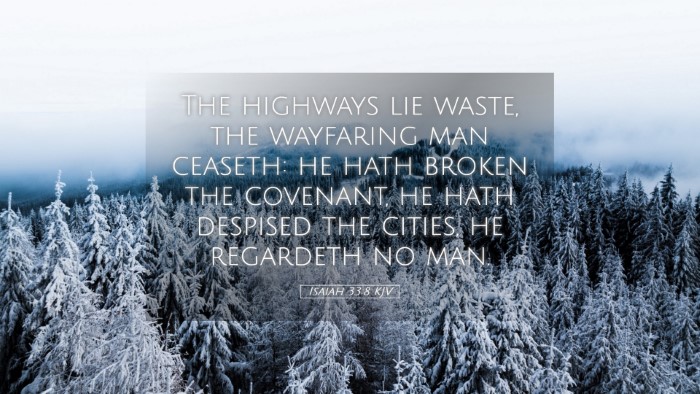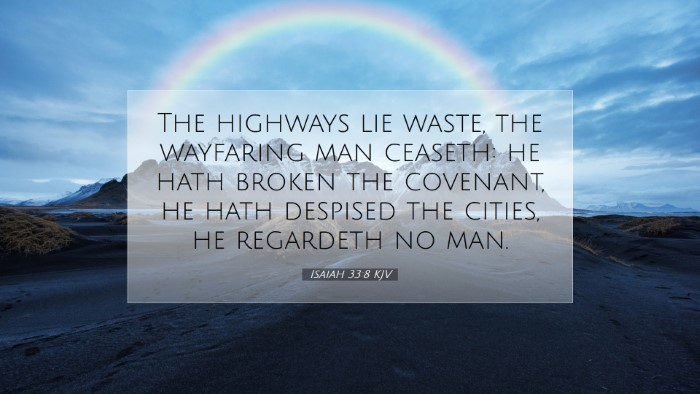Commentary on Isaiah 33:8
Verse: Isaiah 33:8
“The highways lie waste, the wayfaring man ceaseth: he hath broken the covenant, he hath despised the cities, he regardeth no man.”
Introduction
This verse from Isaiah paints a picture of desolation and abandonment. The imagery of desolate highways and forsaken cities serves as a strong metaphor for the moral and spiritual decay within the society being addressed. In this commentary, we will explore the multiple layers of meaning present in this text, drawing insights from interpretations by Matthew Henry, Albert Barnes, and Adam Clarke.
The Current Condition
The phrase “the highways lie waste” symbolizes more than just physical roads; it represents the breakdown of communication and connection among people. As noted by Matthew Henry, highways are essential for movement and the exchange of ideas, trade, and community, and their abandonment suggests a deep societal crisis.
Society in Decline
Henry further elaborates that when the highways are desolate, it indicates a larger forsaking of social order – both in governance and morality. The “wayfaring man ceaseth” signifies that travelers, representing commerce and social interaction, are no longer present, highlighting an atmosphere of fear and violence that has rendered travel unsafe.
Broken Covenant
“He hath broken the covenant” refers to the breach of the agreements established both with God and among men. This alludes to the spiritual failures of the people, as interpreted by Albert Barnes, who emphasizes that covenant-breaking leads to a breakdown of societal structures. It implies turning away from God’s commandments, resulting in a culture devoid of justice and mercy.
The Importance of Covenants
Covenants serve as foundational elements within the social fabric. Adam Clarke reflects on this concept, asserting that the violation of such agreements often leads to divine judgment. In this case, the forsaking of the covenant has led to desolation, illustrating the consequences of turning away from divine commandments.
Destruction of Community
Continuing on Barnes's perspective, “he hath despised the cities” illustrates a significant decline in urban life and communal responsibility. Cities, often seen as hubs of civilization, become places of ruin and social neglect. This degradation not only affects the populace but reflects an abandonment of collective identity and purpose.
Disregard for Humanity
Finally, “he regardeth no man” emphasizes a profound isolation, where mutual respect and regard amongst individuals have eroded. This statement serves as a chilling warning about a society that loses sight of humanity and empathy. Henry highlights that such disregard leads to rampant immorality and social chaos.
Theological Implications
This verse encapsulates both a historical moment and a timeless warning. Theological reflections on Isaiah 33:8 speak to the notion of divine justice and the inevitable consequences of moral decay. It raises vital questions about the current state of society, the role of the church, and the need for a return to covenantal faithfulness.
- The call to repentance: The conditions described in Isaiah prompt leaders and believers to seek restoration through repentance and return to God’s ways.
- A reminder of accountability: The text serves as a sobering reminder of God’s expectations for justice and humility within communities.
- A vision for restoration: Even in despair, there is hope for renewal when men and women choose to reestablish their commitments to God and each other.
Conclusion
In summary, Isaiah 33:8 is a powerful verse denoting the consequences of sin, the repercussions of ignoring divine law, and the breakdown of society. Insights drawn from respected commentaries emphasize the need for collective acknowledgment of our failures and a transformative return to our commitments, both to God and to one another. For pastors, students, theologians, and Bible scholars alike, this passage serves as a critical template for understanding the intersection of faith, morality, and community life.


